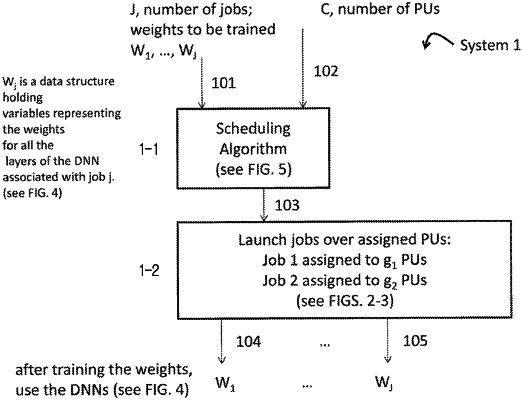| CPC G06F 9/5038 (2013.01) [G06F 9/5061 (2013.01); G06F 18/214 (2023.01); G06N 3/08 (2013.01); G06N 3/084 (2013.01); G06N 5/01 (2023.01); G06N 7/08 (2013.01); G06V 10/764 (2022.01); G06V 10/82 (2022.01); G06V 10/955 (2022.01); G06V 10/96 (2022.01)] | 17 Claims |

|
1. A method of scheduling a plurality of jobs to a plurality of processing units (PUs), wherein the plurality of jobs comprises J jobs, the J being two or more, and the plurality of PUs comprises C PUs, the C being two or more, the method comprising:
initializing by provisionally assigning one PU to each job of the plurality of jobs; and
iteratively identifying and provisionally assigning to determine an allocation from the plurality of PUs to the plurality of jobs, wherein the iteratively identifying and the provisionally assigning, within an iteration, comprises:
at a first step within the iteration, identifying a greatest Time Improvement for running of job per PU based on a doubling heuristic for providing with a doubling of a number of PUs assigned, wherein the iteratively identifying identifies, at the first step within the iteration, that the greatest Time Improvement is associated with a particular job of the iteration,
at a second step within the iteration, provisionally assigning to the particular job of the iteration, an additional first number of PUs, wherein the additional first number of PUs doubles a number of PUs provisionally assigned to the particular job of the iteration, and
stopping the iteratively identifying and the provisionally assigning when a stopping condition is reached, wherein the stopping condition comprises a condition that no more PUs can be further provisionally assigned to any job of the plurality of jobs,
wherein the Time Improvement is determined based on the number of PUs assigned to a jth job, training speed function of the jth job and estimated number of epochs needed to complete the jth job, wherein an epoch corresponds to one set of training data, and wherein j is evaluated from 1, . . . , J within any iteration.
|